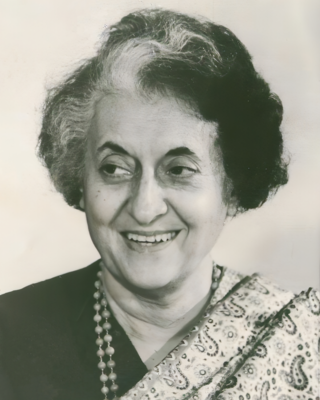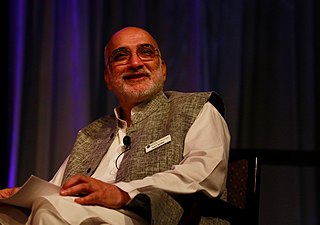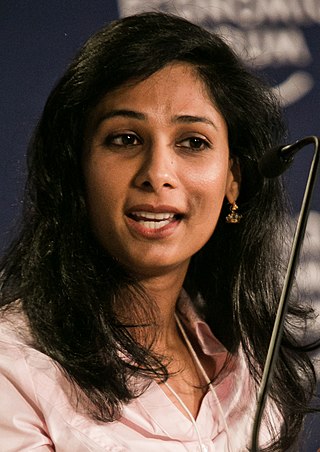
Indira Priyadarshini Gandhi was an Indian politician and stateswoman who served as the 3rd prime minister of India from 1966 to 1977 and again from 1980 until her assassination in 1984. She was India's first and, to date, only female prime minister, and a central figure in Indian politics as the leader of the Indian National Congress (INC). She was the daughter of Jawaharlal Nehru, the first prime minister of India, and the mother of Rajiv Gandhi, who succeeded her in office as the country's sixth prime minister. Gandhi's cumulative tenure of 15 years and 350 days makes her the second-longest-serving Indian prime minister after her father. Henry Kissinger described her as an "Iron Lady", a nickname that became associated with her tough personality.

Delhi University, formally the University of Delhi, is a collegiate research central university located in Delhi, India. It was founded in 1922 by an Act of the Central Legislative Assembly and is recognised as an Institute of Eminence (IoE) by the University Grants Commission (UGC). Delhi University is one of the largest university systems in the world with over 400,000 students on its campuses and affiliated colleges. The Vice President of India serves as the university chancellor. The university is ranked 11th by National Institutional Ranking Framework 2023.

Lady Shri Ram College for Women (LSR) is a constituent women's college, affiliated with the University of Delhi.

Naina Lal Kidwai is an Indian banker, chartered accountant and business executive. She was formerly a Group General Manager and the Country Head of HSBC India. She is also a former President of the Federation of Indian Chambers of Commerce and Industry (FICCI).

Rajiv Mehrotra is an Indian writer, television producer-director, documentary film maker, a personal student of the Dalai Lama for whom he manages as Trustee/Secretary The Foundation for Universal Responsibility established with the Nobel Peace Prize. He is best known as the former acclaimed host of one of India's longest running talk shows on public television, "In Conversation", that has been through several incarnations over more than twenty years, aired on the India's National broadcaster, Doordarshan News Channel, Saturdays at 9.30 pm.

Nirmala Deshpande was a noted Indian social activist who had embraced Gandhi and philosophy. She devoted her adult life to the promotion of communal harmony and service to women, tribal people, and the dispossessed in India.

Lady Hardinge Medical College also known as LHMC Delhi is a Central government's medical college & hospital located in New Delhi, India. Established in 1916, it became part of the Faculty of Medical Sciences, University of Delhi in 1950. The college is governed & funded by Ministry of Health and Family Welfare Government of India.
Salma Malik is a teacher at the Department of Defence and Strategic Studies, Quaid-e-Azam University in Islamabad, Pakistan.

Gita Gopinath is an Indian-American economist who has served as the first deputy managing director of the International Monetary Fund (IMF), since 21 January 2022. She had previously served as chief economist of the IMF between 2019 and 2022.
The Foundation for Universal Responsibility of His Holiness the Dalai Lama is a nonprofit organization established with the Nobel Peace Prize awarded to the 14th Dalai Lama in 1989. According to its website, "the Foundation brings together men and women of different faiths, professions and nationalities, through a range of initiatives and mutually sustaining collaborations."

Subhadra Joshi was an Indian freedom activist, politician and parliamentarian from Indian National Congress. She took part in the 1942 Quit India movement, and later remained the president of the Delhi Pradesh Congress Committee (DPCC). She was from Sialkot.
Manju Bharat Ram was an Indian educationist, who was the founder, chairperson of the managing committee and member of the board of trustees of The Shri Ram Schools, New Delhi; ranked as India's No. 1 day school by Education World’s Schools survey in 2008, 2009 and 2011.

S. P. Varma is a social worker and peace activist from Jammu and Kashmir. He has been actively involved in peace-building efforts in conflict-ridden areas of the Kashmir valley.
Prabhat Nalini Das was an Indian public intellectual, academic and university president. She served as a professor of English and head of the English Department at Lady Shri Ram College, Delhi University; Indian Institute of Technology, Kanpur; Utkal University and Ranchi University. She was the first Director/Dean of the Humanities Division at the Indian Institute of Technology, Kanpur; Founder-Professor and Head of the Department of English at Utkal University for almost 19 years, and Chairman of Utkal University's Post Graduate Council; and the Pro-Vice-Chancellor of North Eastern Hill University, a Central University established by an act of the Parliament of India, with independent charge of its Kohima, Nagaland campus.
Meenakshi Jain is an Indian political scientist and historian who served as an associate professor of history at Gargi College, Delhi. In 2014, she was nominated as a member of the Indian Council of Historical Research by the Government of India. In 2020, she was conferred with the Padma Shri, India's fourth highest civilian award, for her work in the field of literature and education.
Syeda Saiyidain Hameed is an Indian social and women's rights activist, educationist, writer and a former member of the Planning Commission of India. She chaired the Steering Committee of the Commission on Health which reviewed the National Health Policy of 2002, till the dissolution of the body in 2015, to be replaced by NITI Aayog.

Gurmehar Kaur is an Indian student activist and author. Graduating from Lady Shri Ram College, she pursued her masters from Somerville College, University of Oxford. Kaur is also an ambassador for Postcards for Peace, a UK-based charitable organisation that helps eliminate any form of discrimination.
Peacebuilding in Jammu and Kashmir includes confidence-building measures at a nation-state level between the governments of India and Pakistan, track two diplomacy, as well as initiatives by non-governmental organisations (NGOs), institutes and individuals. The purpose of peacebuilding in Jammu and Kashmir include conflict prevention and reduction of hostilities in the Kashmir Valley. Many countries such as Russia, United States and China have also played a de-escalatory role with regard to tensions in the region.
Aarti Tikoo Singh is an Indian journalist who is known for being vocal on the Kashmir conflict and strongly considers herself secular. She is an alumnus of University of Jammu and did Masters in International Affairs from Columbia University in New York City.

Meenakshi Pahuja is an Indian lecturer and marathon swimmer. After a successful career as a competitive swimmer, she became a teacher at Lady Shri Ram College, and later entered open water swimming. She received a 2018 Nari Shakti Puraskar award.












